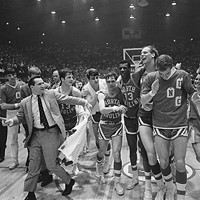"He sang and played with such finesse, with such a mercurial and sensitive relation between voice and guitar and he expressed so much tenderness in the way he handled his lyrics that he went right beyond all his predecessors," Lomax wrote. "His own pieces were more than blues, they were love songs of the Deep South, gently erotic and deeply sentimental."
Like the field recordings that announced Waters' career, Robert Gordon does an equally effective job transporting his readers back in time in his excellent new biography, Can't Be Satisfied. The sound would change, of course, once Waters hit Chicago, electrified it, and changed the blues (and parts of rock & roll) forever, but the fundamental emotions behind it remained the same throughout.
Gordon, author of the much-praised It Came From Memphis, chronicles Waters' journey from illiterate sharecropper to King of Chicago Blues ("Muddy became a genre unto himself") and from outdated relic to revitalized blues ambassador. Waters is, he asserts, the emblem for "the twentieth-century migration from a southern rural culture to a northern urban one, the evolution from acoustic music to electric music, and the acceptance of African American culture into American society" -- in addition to being one hell of a musician.
Gordon begins with what life was like in "the poorest region of the nation's poorest state," where time stood still since Reconstruction and music, along with liquor and sex, were the only secular outlets for Delta sharecroppers. Juke joints, Saturday night fish fries, and the back-breaking, sun-up-to-sundown work that spawned the blues all come to life under Gordon's keen pen. Waters the man emerged from all this; his music from the lineage of earlier bluesmen like Robert Johnson, Son House and Blind Lemon Jefferson.
As strong as Gordon is at recreating Delta life, he does an equally admirable job portraying Waters' rise to fame in blues-crazy Chicago during the late 40s and 50s. He chronicles with an even hand Waters' 28-year, love-hate relationship with Chess Records, his countless extramarital affairs and his general indifference to his progeny, his fondness for cheap champagne and the nightly magic commonplace in Southside joints like the Chicken Shack, the Purple Cat, Romeo's Place, and the Squeeze Club.
Mostly, though, he concentrates on the music. Throughout the book, Gordon deconstructs some of Waters' more well-known, occasionally infamous songs. About "Rollin' and Tumblin'," for instance, he writes:
"The song is little more than a harmonica, a bass drum in overdrive, an occasionally ferocious slide guitar, and the orgiastic humming of several grown men. The sounds are pugilistic and sexual. Someone yelps. Someone else responds. The randomness of the interjections is frightening, the rapid-fire drumming disorienting. Muddy's slide rings like loose spokes on an iron wheel, haywire. The harp is hypnotic. Chant and hum, chant and hum. Violence hangs everywhere, the sex heated and raw."
Gordon goes on -- and sometimes on and on -- but his enthusiasm is a balm for any hyperbolic wounds he inflicts along the way.
And his analysis of what Waters' songs meant in a historical context is always spot on:
"Muddy, near the bottom of the socioeconomic ladder, corralled the sense of postwar possibility and excitement. The have-nots were finally having -- not having much, but even a little was a lot. The muscle of his electric guitar and the force of his ensemble sound and the fierce assertiveness of his voice unleashed the exuberance of a people."
Despite the enormous energy fused during the explosion of Chicago blues, the advent of rock & roll threatened to end (and often did) many an old bluesman's career. It wasn't until Waters went to England in 1958 that the seeds of his renaissance were sown. For it was there, on the distinctly un-Delta like British Isles, that a whole new generation of kids would turn to Waters and his contemporaries for inspiration.
No one was more grateful yet ambivalent than Waters about the success of bands like the Rolling Stones, Led Zeppelin and the Yardbirds, who all owed their early sound to him and the other bluesmen and usually acknowledged their debt: "It took the people from England to hip my people -- my white people -- that a black man's music is not a crime to bring in the house," he said.
Latest in Books
More by John Schacht
-

Two Ex-'CL' Music Editors Put the Charlotte Scene Into Perspective
Apr 26, 2017 -

CD Review: Floating Action's Body Questions
Nov 12, 2014 -

CD review: Buellton's Silent Partner
Oct 1, 2014 - More »
Calendar
-

NEW WINDOW GALLERY-Pat Rhea-ACRYLIC PAINTINGS-April 05-30 2024 VALDESE, NC 28690 @ New Window Gallery/Play It Again Records
- Through April 30, 12 p.m.
-
Derek Hough - Symphony Of Dance @ Ovens Auditorium
-

"Blood Residue Analysis of Paleoamerican Stone Tools in the Carolinas" @ Native American Studies Center
- Fri., April 26, 12-1 p.m.
-

ARTS RENAISSANCE, a GALA supporting the ARTS in South Carolina @ the Columbia Museum of ART
-
 The Piano Guys @ Ovens Auditorium
The Piano Guys @ Ovens Auditorium











